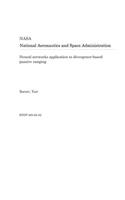
Neural Networks Application to Divergence-Based Passive Ranging
Series:
The purpose of this report is to summarize the state of knowledge and outline the planned work in divergence-based/neural networks approach to the problem of passive ranging derived from optical flow. Work in this and closely related areas is reviewed in order to provide the necessary background for further developments. New ideas about devising a monocular passive-ranging system are then introduc
NaN
VOLUME
English
Paperback

The purpose of this report is to summarize the state of knowledge and outline the planned work in divergence-based/neural networks approach to the problem of passive ranging derived from optical flow. Work in this and closely related areas is reviewed in order to provide the necessary background for further developments. New ideas about devising a monocular passive-ranging system are then introduced. It is shown that image-plan divergence is independent of image-plan location with respect to the focus of expansion and of camera maneuvers because it directly measures the object's expansion which, in turn, is related to the time-to-collision. Thus, a divergence-based method has the potential of providing a reliable range complementing other monocular passive-ranging methods which encounter difficulties in image areas close to the focus of expansion. Image-plan divergence can be thought of as some spatial/temporal pattern. A neural network realization was chosen for this task because neural networks have generally performed well in various other pattern recognition applications. The main goal of this work is to teach a neural network to derive the divergence from the imagery. Barniv, Yair Ames Research Center RTOP 505-64-52...
Price Comparison [India]
In This Series
Bestseller Manga
Trending NEWS




















